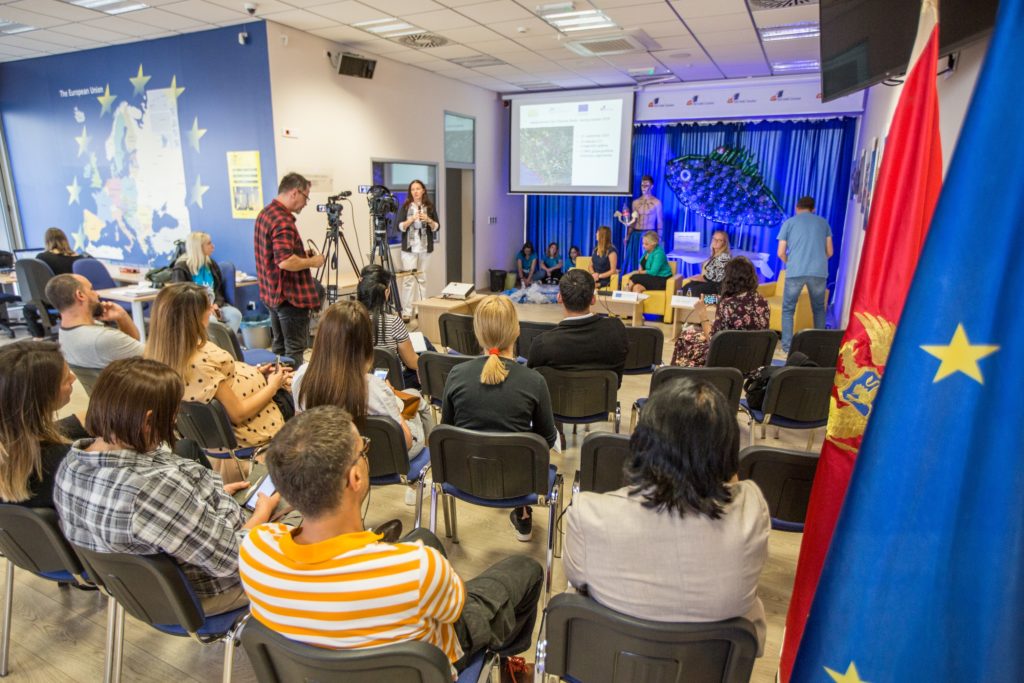The performance “The Furious Poseidon”, where the god of the sea expresses his anger towards waste, was organised by the volunteer NGO Nasa Akcija at the EU Info Centre media conference which presented the preliminary results of cleaning up the coasts, the river and lake shores across Montenegro on the EU Beach Coastal Clean-Up Day.
The results are devastating.
In 11 Montenegrin municipalities (15 locations), more than 560 volunteers collected 5.9 tons of waste, or 926 bags of waste, and as many as 240 car and truck tires. This extensive cleaning action was organised again this year by the NGO Zero Waste Montenegro in partnership with the NGO Nasa Akcija, under the auspices of the Delegation of the European Union to Montenegro and the EU Info Centre.

“The European Union is a leader in environmental protection, and in particular in the fight against plastic. As you may already know, the EU has already made a provision to ban disposable plastic, which will come into force in 2021. In the meantime, the EU is running a strong campaign to raise citizens’ awareness of the harmfulness of plastic to our nature, our seas, and our health,” said Nadezda Dramicanin of the EU Delegation to Montenegro.
Representatives of the EU Delegation to Montenegro helped in cleaning up the shores of Lake Krupac in Niksic. There, together with the gathered volunteers, organisers from the NGO Zero Waste Montenegro and location coordinators from the Ozone Ecological Movement cleaned up the site where a popular music festival usually takes places.
“Every year in September, the EU institutions and Delegations around the world join the international coastal cleaning action. The aim of the action is to not only clear up the shores but to also send a message that each of us should live more consciously. This primarily means that we should use less disposable plastic materials such as straws, plastic bags, cups, plates, and that if we do use them we should dispose of and recycle them properly,” said Dramican at the media conference.
Every year, more and more waste, especially plastic, finds its way to our shores. This fact was brought to light by volunteers of the NGO Nasa Akcija, who said that the situation on our shores is critical because it is almost suffocated in plastic.
“We have many shabby coastlines that are not cleaned and are in very poor condition. This is a problem that needs urgent attention,” said Patricija Pobric, from the NGO Our Action.
The results of this action represent another warning that the coasts of the seas, rivers, and lakes in Montenegro are littered with garbage, especially plastic.
“The most plastic waste collected was 1,775 kg, or 51.60% of the total sample. Other waste accounts for 755.5 kg (21.96%); then scrap metal 408.80 kg (11.88%); glass 228 kg (6.63%); organic waste 221 kg (6.42%), and 52 kg of paper (1.51%),” said Snezana Marstijepovic, who presented the results of the clean-up operations and waste analysis at locations on behalf of the NGO Zero Waste Montenegro.
The waste collected will be categorised and documented as part of the global #BrandAudit2019 initiative. The data obtained will be used to make recommendations for decision makers at the local and national levels, as well as for manufacturers regarding waste reduction, collection, reuse, and better recycling.
